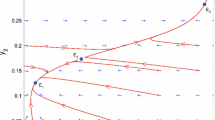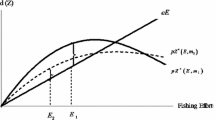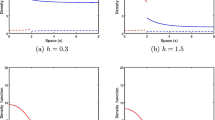Abstract
To help manage the fluctuations inherent in fish populations scientists have argued for both an ecosystem approach to management and the greater use of marine reserves. Support for reserves includes empirical evidence that they can raise the spawning biomass and mean size of exploited populations, increase the abundance of species and, relative to reference sites, raise population density, biomass, fish size and diversity. By contrast, fishers often oppose the establishment and expansion of marine reserves and claim that reserves provide few, if any, economic payoffs. Using a stochastic optimal control model with two forms of ecological uncertainty we demonstrate that reserves create a resilience effect that allows for the population to recover faster, and can also raise the harvest immediately following a negative shock. The tradeoff of a larger reserve is a reduced harvest in the absence of a negative shock such that a reserve will never encompass the entire population if the goal is to maximize the economic returns from harvesting, and fishing is profitable. Under a wide range of parameter values with ecological uncertainty, and in the ‘worst case’ scenario for a reserve, we show that a marine reserve can increase the economic payoff to fishers even when the harvested population is not initially overexploited, harvesting is economically optimal and the population is persistent. Moreover, we show that the benefits of a reserve cannot be achieved by existing effort or output controls. Our results demonstrate that, in many cases, there is no tradeoff between the economic payoff of fishers and ecological benefits when a reserve is established at equal to, or less than, its optimum size.
Similar content being viewed by others
References
Anderson, L.W., 2002. A bioeconomic analysis of marine reserves. Nat. Res. Mod. 15(3), 311–334.
Armsworth, P.R., Roughgarden, J.E., 2003. The economic value of ecological stability. Proc. Natl. Acad. Sci. USA 100, 7147–7151.
Atakan, A.E., 2003. Stochastic convexity in dynamic programming. Econom. Theory 22, 447–455.
Blasius, B., Huppert, A., Stone, L., 1999. Complex dynamics and phase synchronization in spatially extended ecological systems. Nature 399, 354–359.
Blume, L., Easley, D., O’Hara, M., 1982. Characterization of optimal plans for stochastic dynamic programs. J. Econom. Theory 28, 221–234.
Botsford, L.W., Micheli, F., Hastings, A., 2003. Principles for the design of marine reserves. Ecol. Appl. 13(Suppl. 1), S25–S31.
Caddy, J.F., Gulland, J.A., 1983. Historical patterns of fish stocks. Mar. Pol. 7(4), 267–278.
Conrad, J.M., 1999. The bioeconomics of marine sanctuaries. J. Bioecon. 1, 205–217.
De Martini, E.E., 1993. Modeling the potential for fishery reserves for managing Pacific coral reef fishes. Fish. Bull. 91(3), 414–427.
Gell, F.R., Roberts, C.M., 2002. The Fishery Effects of Marine Reserves and Fishery Closures, World Wildlife Fund, http://www.worldwildlife.org/oceans/fishery_effects.pdf.
Guénette, S., Pitcher, T.J., 1999. An age-structured model showing the benefits of marine reserves in controlling overexploitation. Fish. Res. 39, 295–303.
Halpern, B.S., 2003. The impact of marine reserves: do reserves work and does reserve size matter? Ecol. Appl. 13(Suppl. 1), S117–S137.
Hannesson, R., 1998. Marine reserves; what would they accomplish? Mar. Res. Econ. 13(3), 159–170.
Hannesson, R., 2002. The economics of marine reserves. Nat. Res. Mod. 15, 273–290.
Hastings, A., Botsford, L.W., 1999. Equivalence in yields from marine reserves and traditional fisheries management. Science 284, 1537–1538.
Hofmann, E.E., Powell, T.M., 1998. Environmental variability effects on marine fisheries: four case studies. Ecol. Appl. 8(Suppl. 1), S23–S32.
Holland, D.S., 2002. Integrated marine protected areas. Nat. Res. Mod. 15(3), 369–386.
Holland, D.S., Brazee, R.J., 1996. Marine reserves for fisheries management. Mar. Res. Econ. 11, 157–171.
Judd, K.L., 1999. Numerical Methods in Economics. MIT Press, Cambridge, MA.
Kramer, D.L., Chapman, M.R., 1999. Implications of fish home range size and relocation for marine reserve function. Environ. Biol. Fish. 55, 65–79.
Lauck, T., Clark, C.W., Mangel, M., Munro, G.R., 1998. Implementing the precautionary principle in fisheries management through marine reserves. Ecol. Appl. 8(Suppl. 1), S72–S78.
Ludwig, D., Hilborn, R., Walters, C., 1993. Uncertainty, resource exploitation and conservation: lessons from history. Science 260, 7, 36.
National Research Council, 2001. Marine Protected Areas, Tools for Sustaining Oceans. National Academy Press, Washington, DC.
Pauly, D., Christensen, V., Guénette, S., Pitcher, T.J., Sumaila, U.R., Walters, C.J., Watson, R., Zeller, D., 2002. Towards sustainability in world fisheries. Nature 418, 689–695.
Pezzey, J.C.V., Roberts, C.M., Urdal, B.T., 2000. A simple bioeconomic model of a marine reserve. Ecol. Econ. 33, 77–91.
Pimm, S.L., 1984. The complexity and stability of ecosystems. Nature 307, 321–325.
Pulliam, H.R., 1988. Source, sinks, and population regulation. Am. Nat. 132(5), 652–661.
Roberts, C.M., Bohnsack, J.A.M., Gell, F., Hawkins, J.P., Goodridge, R., 2001. Effects of marine reserves on adjacent fisheries. Science 294, 1920–1923.
Roberts, C.M., Branch, G., Bustamante, G.H., Castilla, J.C., Dugan, J., Halpern, B.S., Lafferty, K.D., Leslie, H., Lubchenco, J., McArdle, D., Ruckelhaus, M., Warner, R.R., 2003. Application of ecological criteria in selecting marine reserves and developing reserve networks. Ecol. Appl. 13(Suppl. 1), S215–S228.
Roughgarden, J., Iwasa, Y., 1986. Dynamics of a metapopulation with space-limited subpopulations. Theor. Popul. Biol. 29, 235–261.
Scheffer, M., Carpenter, S., Foley, J.A., Folke, C., Walker, B., 2001. Catastrophic shifts in ecosystems. Nature 413, 591–596.
Shaffer, M., 1981. Minimum population sizes for species conservation. Bioscience 31, 131–134.
Sladek Nowlis, J.S., Roberts, C.M., 1998. Fisheries benefits and optimal design of marine reserves. Fish. Bull. 97, 604–616.
Sumaila, U.R., 1998. Protected marine reserves as fisheries management tools: a bioeconomic analysis. Fish. Res. 37, 287–296.
Suman, D., Shivlani, M., Milon, J.W., 1999. Perceptions and attitudes regarding marine reserves: a comparison of stakeholder groups in the Florida Keys National Marine Sanctuary. Ocean Coastal Management 42, 1019–1040.
Tuck, G.N., Possingham, H.P., 1994. Optimal harvesting strategies for a metapopulation. Bull. Math. Biol. 56(1), 107–127.
Tuck, G.N., Possingham, H.P., 2000. Marine protected areas for spatially structured exploited stocks. Mar. Ecol. Prog. Ser. 192, 89–101.
Author information
Authors and Affiliations
Corresponding author
Rights and permissions
About this article
Cite this article
Grafton, R.Q., Kompas, T. & Lindenmayer, D. Marine reserves with ecological uncertainty. Bull. Math. Biol. 67, 957–971 (2005). https://doi.org/10.1016/j.bulm.2004.11.006
Received:
Accepted:
Issue Date:
DOI: https://doi.org/10.1016/j.bulm.2004.11.006




